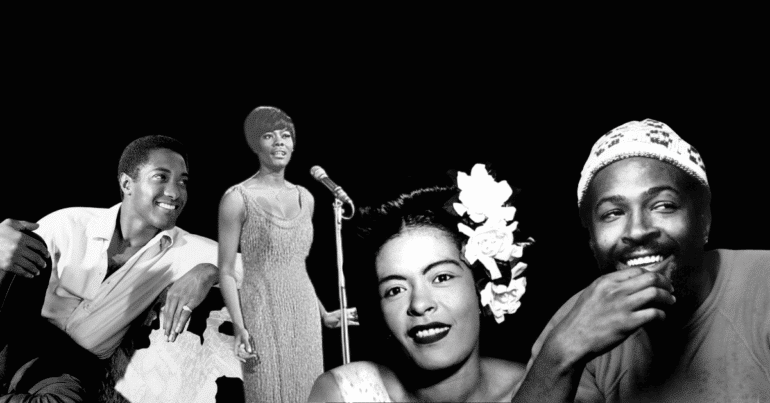A look at how the icons of Soul Music responded to their socio-political landscapes and shaped black American history with their music
For a genre named Soul, it’s expected that an everlasting fire lies at its core. Soul music champions emotional intensity, often idolising romance and the messy process of falling in and out of love. However, Soul is also power, connection and truth. Throughout its history, artists have used its charm to spread political messages and cautionary tales.
In a way Soul music is sneaky, we know the lyrics to captivating songs without realisation – as if it was smoothly sung into our ears like a parents lullaby we can never forget the moral and melody of. Making it the perfect genre to communicate such messages in the midst of the love is so sweet tracks. So, we’re taking a walk through how some of the greats of Soul Music unapologetically responded to the politics of their time. Is it possible their messages ring true solely for the ears of their eras, or are they relevant to our current realities too?
Billie Holiday’s rendition of the poem about brutality and race in 1900s United States
Billie Holiday also known as Lady Day recorded the notable poem penned by Abel Meeropol in 1939, written after he saw the horrific image of two Black men in Indiana being lynched. Although Holiday was not a soul singer, it’s important to note that Blues and Swing is the predecessor of Soul music, influencing and inspiring many of the Soul legends we know and love. ‘Strange Fruit’ is a song she would sing with no encore. Consisting of just twelve lines she carefully pronounced each word to ensure they landed directly upon the listeners eardrums, reverberating into their minds the barbarity that occurred in the south. Her raspy voice almost sounds as if she’s been crying, lending to the sombre mood of the song. It’s of no wonder that ‘Strange Fruit’ was announced the song of the century by Time in 1999, 40 years after its release.
John Coltrane’s requiem after a church bombing in 1963 – Alabama
Saxophonist John Coltrane composed Alabama after a Klu Klux Klan attack resulting in the death of four young girls. An instrumental piece, Alabama was inspired by Martin Luther King’s oration on the tragedy, innovatively patterning his saxophone to the cadences of his speech. ‘Alabama’ begins with a melancholy atmosphere mimicking the retelling of bad news. However, it soon continues to rise in anger and determination. Towards the tracks ending there is a clangour and crash of the drums, booming pianos and Coltrane’s weeping saxophone. It’s combination mimicking that of crashing of bricks, piercing sirens and wails before the track ends in silence as if the full boulder of shock and grief has hit. It’s a stunning and sonically intentional piece with a raw vulnerability whose lack of words is even more healing than if a single sentence was whispered.
An illustrious and hopeful track by Sam Cooke – A Change is Gonna Come
Written and performed by Sam Cooke, ‘A Change is Gonna Come’ was inspired by Bob Dylan’s song ‘Blowin’ in the Wind’. The track flows like a diary entry revealing the struggles experienced by African Americans living in the US. Yet, despite the unadorned lyrics the assemblage of the track is majestic and dramatic. Listening to ‘A Change is Gonna Come’ evokes heart-rendering, hopeful emotions that feel new and relevant upon every listen. So much so that Bettye LaVette performed the song at Obama’s inauguration, changing the lyrics to “I know a change has come.”
A push towards celebrating Blackness by Soul Music icon Nina Simone – Young, Gifted and Black
Nina Simone’s‘Young, Gifted and Black’ is a widely renowned track commemorating blackness, inspired by playwright Lorraine Hansbury’s production of the same name. Upon seeing an article detailing the play she said “I remember getting a feeling in my body, that’s it to be young, gifted and black that’s all”. Two days later the song was finished with the help of composer Weldon Irvine. It was then debuted to a live audience at the Harlem Cultural Festival on a scorching summer’s day filled with joyous black faces in a black space. ‘Young, Gifted and Black’ is a trumpet call commanding all Black people to step forward and declare these words. Nina Simone’s passionate voice pushes the words from her soul directly into the microphone, perfectly enunciated as if to say ‘did i stutter? Young, Gifted and Black it’s where it’s at!’
Nina Simone had other anthems to black liberation, including the iconic and much covered, ‘Feeling Good’.
Dionne Warwick’s rendition to raise money for the aids crisis –That’s what friends are for
Throughout her six-decade career, Dionne Warwick has continuously been a pioneer towards raising attention and money towards the AIDS crisis. Becoming sensitive to AIDS affecting so many people within the industry, including her late valet. Consequently Dionne Warwick then headed the 1985 cover of ‘That’s What Friends are For’ alongside Elton John, Gladys Knight and Stevie Wonder, created to raise money for the American Foundation for AIDS Research. A heartwarming song, composed of distinctive voices creating a feel good platonic love-song in the midst of a heavily stigmatised epidemic. The incredible life and career of Dionne Warwick is recorded in an intimate documentary-film featuring iconic contributors such as Quincy Jones, Burt Bacharach, Bill Clinton, Elton John, Snoop Dogg and more to be released on 7 November 2022.
Soul Music’s golden child, Marvin Gaye’s Award winning concept album chronicling man made crises – What’s Going On
Despite Founder of Motown Berry Gordy’s hesitations towards the album being released, What’s Going On was a critical and commercial success. Marvin Gaye didn’t hold back from discussing the abysmal treatment of people and the planet, from racism and police brutality to environmental decline and war. What’s Going On is a work of art that effortlessly coasts from one track to the next. Its seamless ability to segue implying that each issue presented also bleeds into the other. The track ‘Mercy Mercy Me’ became one of his most notarized songs, listing the consequences of the ecological crisis. Despite the explicit lyrics you can almost get captured by its melodious air, however Marvin Gaye’s mournful tone brings listeners back to the depth and intentionality of each song.
Timed or timeless?
Each of the musical project listed were songs pivotal for the time they were made in, and in most cases their honesty equaled controversy. These artists were met with hesitations from their own peers and rebuttal from those who were left displeased and uncomfortable by the simple truth of their lyrics such as ‘Strange Fruit’. Yet, despite their current realities being the catalyst for these songs, most of the messages still have a sense of relevance and familiarity to them today. Perhaps they are timeless in sentiment, but can age in taste as we explore new variants of soul music – are they songs you’ll be playing in years to come, or are they references and future samples for present and anticipated climates?
If you want to hear more iconic songs created by legends of soul, jazz and funk head to LexTempus in Waterloo, London. LexTempus is a multi-sensory music experience, a unique opportunity to fully immerse yourself in the defining eras of Black American music.


